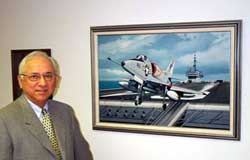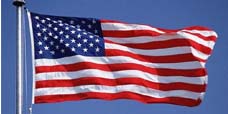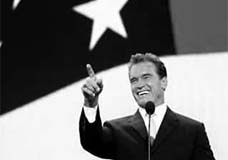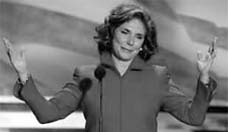
Everett Alvarez Jr. served under President Ronald Reagan, who named him as the No. 2 official at the Peace Corps
Hispanic Former Combat Pilot Talks About
POW Experiences
By Rudi Williams
AFPS
Caption: Retired Navy Cmdr. Everett Alvarez Jr. said when he got a commission in the Navy in 1960 there were only a few Hispanics going to flight training. "Today," he said, "you see a heck of a lot more, because the opportunities are greater and the push is greater." Alvarez is standing by a painting of the A4C Skyhawk jet fighter he was shot down in over North Vietnam on Aug. 5, 1964. Photo by Rudi Williams / DoD Photo
MCLEAN, Va.– Reflecting on the times his North Vietnamese captors threatened to put him on trial and punish him for his crimes with a possible death sentence, Everett Alvarez Jr., 67, said, "There wasn't anything I could do in the prison cell we later called 'The Hanoi Hilton.' I figured, if they kill me, they kill me. What can I do?"
One of only a few Hispanic Navy combat pilots at the time, the then 26-year-old Mexican American was at first the only American incarcerated in what became known as the infamous "Hanoi Hilton" prison. His only prison mates were Vietnamese criminals until the Vietnam War heated up and more Americans were captured. That's because on Aug. 5, 1964, Alvarez became the first American aviator shot down over Vietnam.
It was the first clash between U.S. and North Vietnamese forces. He was participating in a retaliatory strike on strategic points in North Vietnam after North Vietnamese PT boats fired torpedoes at the destroyer USS Maddox in international waters in the Gulf of Tonkin three days earlier.
"I had no choice" but to eject, he said. "If I felt I had a chance, I'd have ridden it down, but the plane started to come apart. I'd lost a wing, there was a lot of smoke, the plane was on fire, and every emergency indicator went off all at once. I knew if I stuck with it I was definitely not going to make it."
He landed in the middle of a small fleet of fishing boats, and the North Vietnamese fishermen fished him out of the water. "I learned later that those fishing boats were like a little militia, all with rifles and other weapons," said the A4C Skyhawk pilot who was assigned to Attack Squadron 144 aboard the USS Constellation.
"I thought they were going to kill me," said the recipient of the Silver Star Medal, two Legion of Merit awards, two Bronze Stars, the Distinguished Flying Cross and two Purple Hearts. "But they put me in a local jail cell with my legs in leg irons. I just plopped – I was out!"
That was the beginning of eight and a half years as a POW – the longest held prisoner of war at the Hanoi Hilton, but not the longest held POW of the war. "At the time, I didn't know an Army Special Forces guy had been captured in South Vietnam," Alvarez noted. "I found out through propaganda photographs at the camp."
Interrogations were minimal, Alvarez said. "They were trying to find out who I was. I don't think they knew what to do with me for the first couple of weeks. Then they took me to Hanoi after about a week.
"For months, I wasn't -- in their view -- a prisoner of war," Alvarez noted. "In 1964, there was no declaration of war, no relationship, no communications between the U.S. and North Vietnam."
Alvarez thought of trying to escape, but he looked around the inside of the prison compound and realized that his cell was inside another compound. "After several months, I started to think, 'Maybe they're not going to kill me," he said. "Maybe I'll make it. It was a learning experience."
With no comrades to rely on for support, Alvarez summoned up his own strength from his training. "Since I was all by myself, I figured I'd go on my basic training and instincts, hang in there and deal with the situation as best I could," he said.
But life wasn't easy at the Hanoi Hilton and there weren't any five-star dinners. For example, one day when he uncovered his dinner plate, Alvarez was surprised to find the culinary delight of the day was a bird floating in grease with full feathers unplucked. Many meals were "rice a la cockroach" and other "dirty food" throughout his imprisonment, he said.
Calling the food "horrible," Alvarez said his captors started giving him special food after the normal diet kept making him sick. "The food was not good for years, and then toward the end, they started to improve it," said Alvarez, adding that throughout the ordeal, he suffered a lot of diarrhea and dysentery.
"We ate a lot of rice," the retired Navy commander said. "When we got on a steady diet, we had a lot of pumpkin soup during the summer with very little pumpkin. We had 'sewer greens' in the cold months. It was the leafy plant on top of the areas where people dumped their waste."
Alvarez guessed that there were a lot of vitamins in the leaves, but he said it was very dirty, including parasites – long worms. "I had hepatitis from the needle shots because they used the same needle," he added. "I guess it was injections to prevent illness.
"In my opinion, the food improved along with our conditions," he continued, "because they recognized that we were going to be an important part of the outcome of the war," Alvarez noted. "They recognized that we were a bargaining portion and started to take better care of us beginning in late 1969, especially in the last year when the U.S. started bombing the north again. The harder we bombed, the better the treatment."
Even with the harsh treatment and terrible food, Alvarez attributes his survival to the North Vietnamese giving the prisoners "sufficient food." And he added, "When a person got very ill, they got some basic health care. But only a few people who sustained serious injuries during their ejection made it. We managed to take care of ourselves a lot with basic hygiene."
Prisoners weren't even allowed to have playing cards until 1970. "Any time they found something we'd made to entertain ourselves, they would punish us," he recalled. "As the policy started improving, they gave us playing cards."
As the prisoner population grew, they learned to communicate because it was important to keep the unity of the group, he noted. "We were in separate cells, separate rooms and separate buildings, but we developed a system to communicate so we could maintain cohesiveness as a military unit," Alvarez said. "They would try to work on your sympathies." His captors tried to exploit the fact that he was a member of a minority by saying he was discriminated against in America.
Finally, Alvarez was released from the POW camp on Feb. 12, 1973, along with more than 575 other POWs, and returned home. His marriage had not survived his captivity.
There were many hard things during captivity, but giving up hope wasn't an option, Alvarez said.
"I recognized the resiliency of the human spirit and that physically we'd been in a situation that very few people encounter," Alvarez noted. "Thank God that I had my faculties. I've got my problems physically, but that's minor compared to others who lost a lot. So I consider myself very fortunate."
He said he got his life back together, cleaned up his former marriage through the courts, got married, started a family and went on with his career. After retiring from the Navy, he became founder and president of Conwal Inc., a management consulting firm in McLean in 1987. He also earned a law degree and continued his government service.
Alvarez earned a bachelor of science degree in electrical engineering from Santa Clara (Calif.) University in 1960 and received his commission in October 1960 through the Navy Aviation Officer Candidate Program. He took flight training in Pensacola, Fla., and Kingsville, Texas, being designed a naval aviator in November 1961.
"I always had a yearning to fly as a little kid," said Alvarez, whose name graces a high school in Salinas, Calif., a post office in Rockville, Md., Alvarez Village on a military installation and a park in the City of Santa Clara. "We used go out an play in an area outside Salinas where there were a bunch of cannibalized bi-wing airplanes they used as crop dusters. We'd sit out there and play; even in college I'd watch the jets come into Moffitt Airfield. I always wondered about that."
He served under President Ronald Reagan, who named him as the No. 2 official at the Peace Corps. He was later tapped as deputy secretary of the Department of Veterans Affairs, and then became the secretary of that organization. Alvarez also chaired the Cares Commission for the VA and was a member of the President's Task Force for Healthcare Reform.
Alvarez said before going to Vietnam, his ethnicity background wasn't a big deal where he grew up. But he noted that something happened during the 1960s, probably as a result of the civil rights movement.
"My ethnicity is Mexican American; my culture is American," he said. Noting that everyone is a product of their environment, Alvarez said, "I grew up in a very multicultural agricultural environment that was mixed with Hispanic, Asians, Filipinos, Japanese, Chinese, Italian and not many African Americans or Jewish people. So I grew up taking for granted my neighbors, who were of all different ethnicities. There weren't any barrios in my neighborhood."
He said his grandparents came to the United States from Mexico in the late 180s0 and early 1900s. His mother was born in California and his father in Arizona.
Hispanic American Heritage Month was established to recognize and to spread a better understanding of the heritage and its contributions to this nation, Alvarez noted. "I grew up in that environment, and we took it for granted," he said.
Alvarez said he remembers when out of more than 1,000 students at Santa Clara University, only about three were Hispanic. "It wasn't because of race, bias or discrimination," he said. "It was more economic driven. Not many families with Spanish surnames had the money to go to college. I was able to get a partial scholarship. But in those days, there wasn't an incentive to go to college for many kids with Spanish names. Others joined the military, but I hung around with kids that had the same incentive I had. But today, there's a large Hispanic group.
"When I came in the military, I saw only one other Hispanic coming through flight training programs," he continued. "Today, you see a heck of a lot more, because the opportunities are greater and the push is greater."
Alvarez has been on the Board of Regents at Uniformed Services University of the Health Sciences in Bethesda, Md., for more than 16 years, and is on his second tenure as chairman of the board. His wife, Tammy, works on a volunteer basis to raise the visibility of the university and its relationship to military medicine. She's working on raising private sector funding to do a documentary film about the university.
The university is "the West Point of military medicine," said Alvarez, whose youngest son, Bryan Alvarez, 28, is slated to graduate from medical school in May 2005 and receive a commission as a lieutenant in the Naval Medical Corps. His oldest son, Marc Alvarez, 30, is a Princeton University graduate.
"Most people don't know about the contribution that this institution is making to military medicine," said Alvarez, the only non-medical person on the board.
Alvarez has co-written two books with Anthony Pitch: "Chained Eagle," the story of his captivity peppered with little bits of his growing up. The other book is called "Code of Conduct," which is the story of his life up to 1990. He's in the process of getting "Chained Eagle" reprinted, he said.





